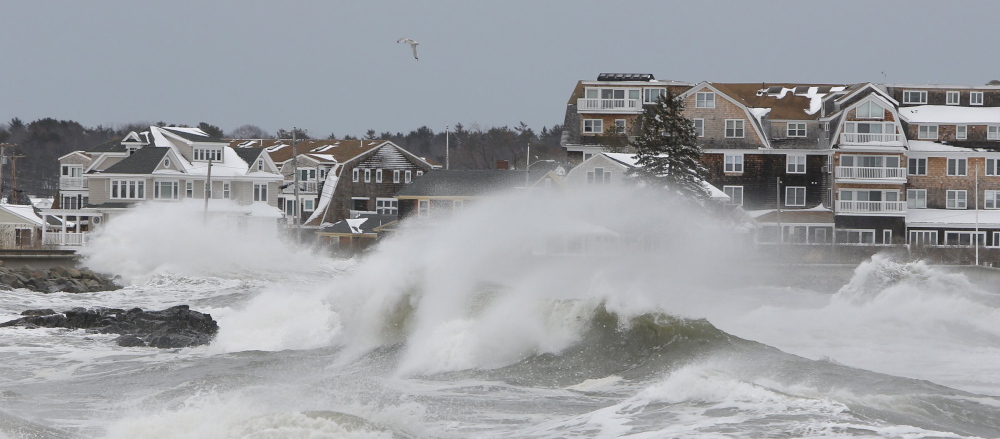WASHINGTON — The U.S. Senate voted Thursday to grant a reprieve to homeowners across the country — including potentially thousands in Maine — who were facing steep increases in their flood insurance premiums.
The Senate voted 67-32 to delay by up to four years any increases in flood insurance premiums resulting from new flood zone maps and regulatory changes enacted in 2012. Both Maine’s senators — Republican Susan Collins and independent Angus King — supported the Senate bill.
The legislation will now go to the House, where it will likely face stronger opposition from Republicans concerned that it will undo reforms intended to financially stabilize the flood insurance program.
Lawmakers from coastal states are pushing for the delay after hearing from property owners facing dramatic premium increases.
New maps from the Federal Emergency Management Agency expand flood zones farther inland, which increases the number of homes and businesses considered at risk of flooding. At the same time, many homeowners who already have flood insurance are losing federal subsidies that lowered their premiums, a result of the 2012 regulatory changes enacted to stabilize the debt-riddled program.
King said that while the flood insurance program must be reformed, the Senate bill would provide homeowners and communities more time to work with FEMA on the new maps. Several coastal Maine towns are appealing the redrawn maps.
“It is imperative that FEMA’s flood maps accurately reflect the actual, scientific flood risk to homes and communities along Maine’s coast,” King said in a statement after the vote. “The Homeowner Flood Insurance Affordability Act would delay impending rate increases for Mainers and provide FEMA with additional time to engage and collaborate with communities on better, more localized data that will ultimately produce more precise maps and more accurate premiums.”
Members of Maine’s congressional delegation have also urged FEMA to allow local communities to submit their own expert-prepared reports on local areas at risk of flooding as part of their appeals.
“The process of devising maps must also include stakeholders of affected communities,” Collins said in a statement. “An inaccurate flood map can subject homeowners and businesses to unnecessarily high insurance premiums that can be financially devastating, threatening businesses’ ability to stay in business and homeowners’ ability to afford to insure their homes.”
Lawmakers from hurricane-battered Gulf Coast and mid-Atlantic states have led the charge on the issue. Speaking after Thursday’s Senate vote, several told of constituents unable to pay insurance premiums that jumped from a few hundred dollars a year to several thousand. Others were having trouble selling houses because of the high premiums.
“Something is terribly wrong when homeowners are more worried about raging flood premiums than they are about raging flood risk,” said Sen. Jeff Merkley, D-Ore.
Sen. Bob Menendez, D-N.J., the bill’s lead sponsor, said the bipartisan Senate vote should give the bill solid momentum as it heads to the House.
“I am personally optimistic that once the speaker (John Boehner) sees the strong bipartisan support … and hears from the 181 co-sponsors the bill has in the House — including 55 Republicans — that he will agree with us,” Menendez said.
In Maine, homeowners and community leaders in York and Cumberland counties are studying whether they want to appeal the new FEMA flood maps used to calculate rates for federal flood insurance.
Some areas in York and Cumberland counties that have been considered at low risk of flooding would be re-designated as high-risk — likely causing sharp increases in insurance costs or restrictions on development — while other property owners could have to buy insurance for the first time.
In addition, roughly 3,300 property owners in Maine receive the federal subsidies that are being phased out, and which cannot be transfered to new home buyers under the 2012 law.
King said the Senate bill includes language he added that would allow towns to be reimbursed for costs of their appeals should the maps be ultimately redrawn.
Send questions/comments to the editors.




Success. Please wait for the page to reload. If the page does not reload within 5 seconds, please refresh the page.
Enter your email and password to access comments.
Hi, to comment on stories you must . This profile is in addition to your subscription and website login.
Already have a commenting profile? .
Invalid username/password.
Please check your email to confirm and complete your registration.
Only subscribers are eligible to post comments. Please subscribe or login first for digital access. Here’s why.
Use the form below to reset your password. When you've submitted your account email, we will send an email with a reset code.